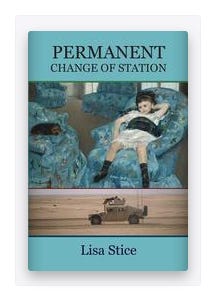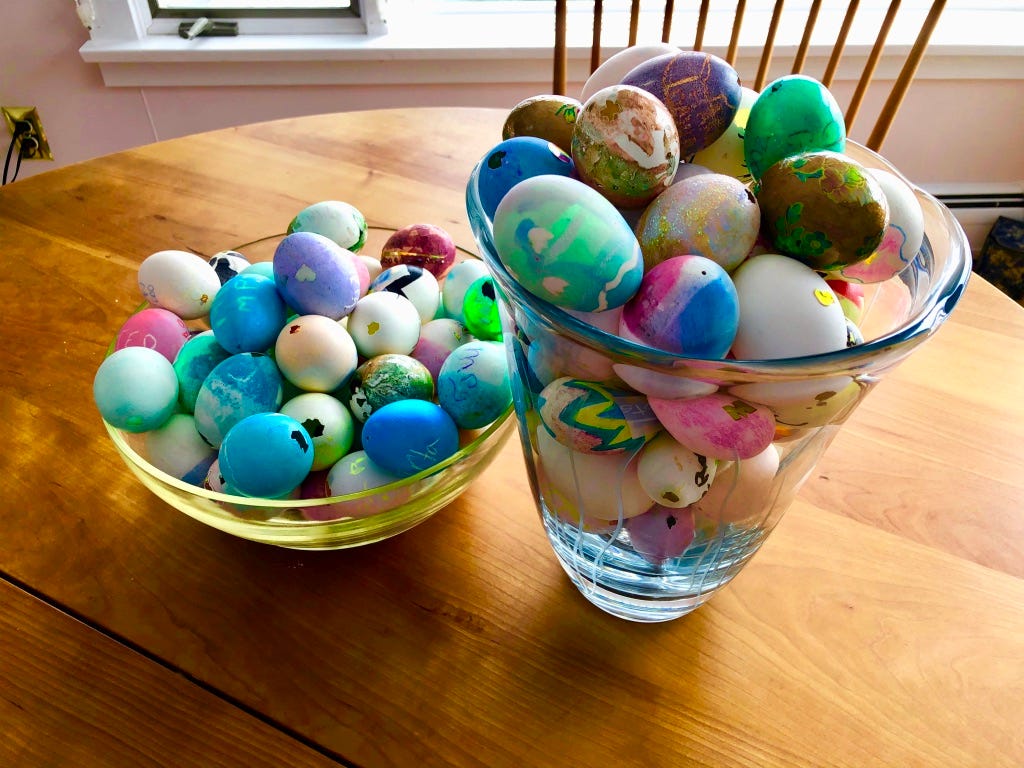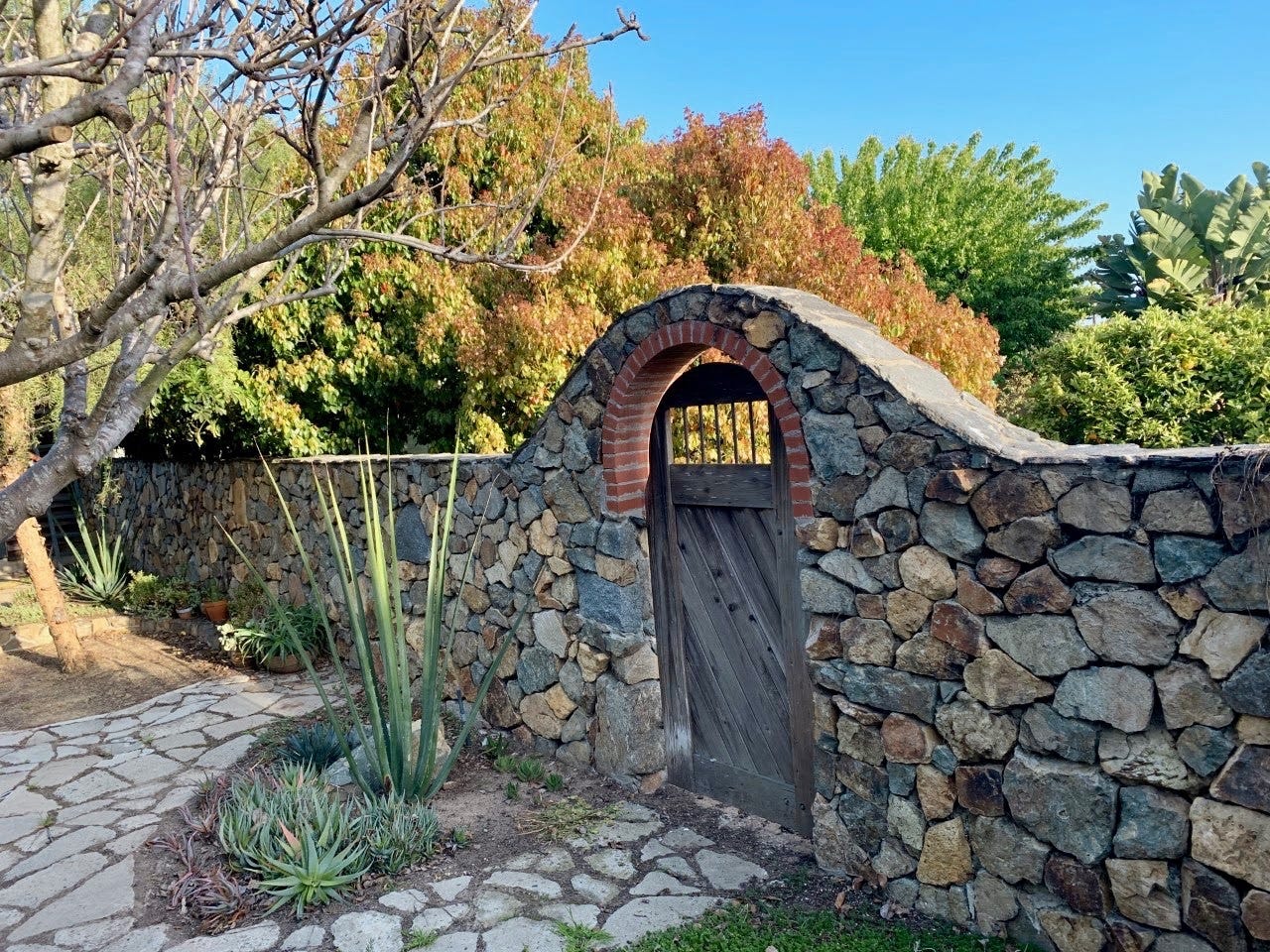“Don’t be polite.
Bite in.
Pick it up with your fingers and lick the juice that may run down your chin.
It is ready and ripe now, whenever you are.” - Eve Merriam, “How to Eat a Poem”
Inside this issue:
Vaccine hunting and a humbling reminder
A special project for National Poetry Month
Is there anything more Zen than a wall built stone by stone?
My Turn
As the clock ticked midnight Wednesday I sat in front of my computer, hitting the refresh button like a lab rat hits a lever to get a treat in its cage. I wanted to catch the new day as it began. I wanted to grab one of the vaccine appointments that were rumored to be opening up now that my age group qualified.
I was ready. I’d read all the most recent newspaper articles about which sites were making appointments and which ones would depend on the dreaded state site called “My Turn.” I’d been a good girl. I’d waited until it was, in fact, my turn. I didn’t stretch the truth about my medical conditions even though everyone said “they don’t make you confirm it” at the vaccination sites. Not that I deserve to be canonized or anything. That would be for the people who are struggling to make sure that the most vulnerable and most essential folks get their vaccines.
I struggled to keep thinking of those people as I hit the refresh button over and over again. Instead I got so angry at the people who run the “My Turn” site and all the people who run the Vons, the CVS, the Walgreens, the county sites and all the sites that kept coming up “sorry, no appointments available.” I tried to be rational. There was bound to be a rush. There would be many chances in the days ahead. A surplus of vaccines was expected by May. It was only a few more weeks. What’s a few more weeks? Still, I couldn’t stop hunting.
Then the most wonderful thing happened. I found out I wasn’t alone. A fellow San Diegan had started a Facebook group page so that we could all share information and help each other get vaccines. I’d joined Wednesday afternoon as part of my preparations. Rigid with disappointment and frustration, I clicked into the group to see what I could find out. There, a person I’d never met and will never meet posted a direct link to a place where there were still appointments to be had. In a few minutes I had one. I don’t know what it will feel like to actually get the vaccine. Friends have wept, called other friends gleefully, had all kinds of reactions to receiving their shots. But I don’t think I could feel any more relief and gratitude than I felt for a fellow San Diegan who could have made his appointment and gone to bed but instead made sure he helped a bunch of us.
After getting a little sleep, I tried to pay his kindness forward. On Thursday morning, I spent another couple of hours on the group page. I’d found a slew of appointments at Costcos around the area and tried to share the links as widely as possible. It felt good to. It was not lost on me that my luck didn’t change until I gave up on the idea that it was “my turn” and joined a community of folks who wanted it to be everybody’s turn. I am humbled. I’m grateful.
The shot isn’t going to magically restore life to normal. I know that. We all know that. It does feel hopeful, though. It does feel a little like the early, tentative days of spring after a long winter.
A Special Project for National Poetry Month
Confession. As an adult, I have very rarely sought out poetry. I cannot remember a time in my twenties, thirties, forties, or fifties, when I picked up a volume of poetry to read and I rarely associated reading poems with pleasure. They were work. Sometimes the work was beautiful. Sometimes it was frustrating, like trying to follow a thread in the improvisations of John Coltrane or Miles Davis wishing for the straightforward melodies and rhythms of B.B. King. I’ve always felt that I needed to understand more about poetry (and jazz for that matter) to discuss it intelligently.
I’m not sure what has changed except that it has finally dawned on me that I’m missing out. Poets are writers. All writers experiment with ideas, words, new ways of saying things we already know. Sometimes their experiments work, sometimes they fail. Sometimes they reach vast audiences. Sometimes they touch only a few people. In the end, we know what we are drawn to and maybe it is time to trust that.
I’m ready to risk feeling a little at sea, a little frustrated sometimes in order to connect with the heart and mind of a writer who can reveal life to me in a precious few well-chosen words so I’ve been reading poetry. For National Poetry Month, I thought it might be nice to share some of the poems and poets who have helped to open this part of the world up to me.
Lisa Stice
Over the next four Saturdays, each issue of Spark will introduce a poet with one of their poems. Each will then share a poem by another poet whose work matters to them. We are launching this project with Lisa Stice, a poet and has drawn extensively from her experience as a military spouse. Lisa also happens to be a member of the Spark community. Here’s a little more about her and then, her poem “Lessons in Leaving” which was published in White Stag’s Watertome Anthology 2020. The poem is dedicated to / inspired by Eva Saulitis, an essayist, poet, memoirist, and conservationist who died in 2016.
Lisa Stice is a poet/mother/military spouse, the author of two full-length poetry collections, Permanent Change of Station (Middle West Press, 2018) and Uniform (Aldrich Press, 2016), and a chapbook, Desert (Prolific Press, 2018). She is a Pushcart Prize nominee who volunteers as a mentor with the Veterans Writing Project , as Poetry Editor for The Military Spouse Book Review, as Poetry Editor for Inklette Magazine, and as a writer for the Military Spouse Fine Artists Network (Milspo-FAN). She received a BA in English literature from Mesa State College (now Colorado Mesa University) and an MFA in creative writing and literary arts from the University of Alaska Anchorage. While it is difficult to say where home is, she currently lives in North Carolina with her husband, daughter and dog. You can learn more about her and her publications at lisastice.wordpress.com and at facebook.com/LisaSticePoet.
A Lesson in Leaving
For Eva Saulitis*
Cell by cell, a body is built,
and cell by cell, a body diminishes,
but still, there are words upon
words upon words that converge
to say something, to say a prayer
at first almost inaudible then crescendo
of song. Molecule by molecule, water
binds and flows to the ocean, rises
to the sky and falls again as rain or
snow. Cell by cell, an orca forms
inside another orca, and its birth
is heard throughout the seas, inlets
and rivers carrying the news. - Lisa Stice
* Eva Saulitis (1963-2016; United States): non-fiction essayist (Leaving Resurrection and Becoming Earth), poet (Many Ways to Say It and Prayer in Wind), memoirist (Into Great Silence: A Memoir of Discovery and Loss among Vanishing Orcas), teacher, and conservationist
Lisa’s Poem Share: Kersten Christianson’s “Perrennial”
Lisa Stice: “I'm sharing Kersten Christianson's poem "Perennial." Poetry by Kersten Christianson - Anti-Heroin Chic (weebly.com) Kersten is a fellow UAA MFA poet, and her poems are like magic spells. Her latest book Curating the House of Nostalgia (Sheila-Na-Gig Editions, 2020) is a collection of poems written after her husband's passing. They're sometimes sad, sometimes funny, and always beautiful.”
Perennial
Enraged, the land wildfires (lightning match spark kindle). The lines shift, adjust like a kelp-tossed shore by a tide whose water is not gifted for battle. Suppression waxes / wanes while crew and beast meander burnout, their forms mere shadows in the charcoaled smoke. Hazed / dazed, the sun is a pinhole viewed through a sepia filter; blood orange rimmed crimson, a sleepless eye. I hear fireweed is the first returner / responder to a stand of black spruce cresiped / aged to lustrous toothpicks for years after a firey event. Pale standing wood bears luminous signature, runes of warning / evacuation, calamitous loss. Grounded in a house of time, rooted in both memory / future, fireweed unfolds her foliate arms in ravaged / displaced forest, coaxed by stellar light / instinct. Hers is a ground swelling tease, a verdant display of spring sprout (green lush leaf), undulating arms beckoning breeze. As she lays hands on ravaged wood, her summer frenzy shimmies into amaranthine glow, speaking in tongues efflorescence. Nectar beguiles both bee / hummer in a short, splendid upsurge of growth / violaceous bloom. Casting seed, she dances like a groupie to Neil Young’s “Harvest Moon,” before blazing mottled tiger yam, dropping under fall rains / freezing temperatures.
Head to ground, she weeps
in rains not knowing words
of loss, grief, return.
Short Reads: From my Inbox
Sometimes my inbox contains nuggets of gold. Here are three things that came in just when I needed to read them.
How to Eat A Book. This brief post from Austin Kleon’s really wonderful blog and newsletter is a juicy reminder that a book or a poem is not simply a collection of words. At their best, they are food for the soul, experiences to be shared.
Don’t Worry About Rules. Advice from Andrew Merton, next week’s poet in our project for National Poetry Month:
“Don’t worry about rules, conventions, what a certain poem means, any of that. Just react viscerally, as you would to, say, a painting (as with paintings, poems range from realistic through impressionistic on into surreal) or a piece of music. Here’s a link to a great poem by Billy Collins about an Intro to poetry class he teaches:
Introduction to Poetry
I ask them to take a poem
and hold it up to the light
like a color slide
or press an ear against its hive.
I say drop a mouse into a poem
and watch him probe his way out,
or walk inside the poem’s room
and feel the walls for a light switch.
I want them to waterski
across the surface of a poem
waving at the author’s name on the shore.
But all they want to do
is tie the poem to a chair with rope
and torture a confession out of it.
They begin beating it with a hose
to find out what it really means.
A Slog, A Slide, or a Mindful Walk? This email came from a friend who needed to tell me not about the book she just finished but how it felt to read it.
“Have you read the novel The Thirteenth Tale by Diane Setterfield? I finished it this morning, just in time to get ready for work (though I'm putting that off by writing this now). It wasn't really a page-turner so much as one of those books where the momentum seems to build, like each time you return to the pages you're more committed to the characters and seeing it through. And by the end I guess the pages did turn. When my alarm went off earlier than I'd need to get fully sufficient sleep, finishing the book is what got me out of bed.
Now I'm in that afterglow. There is no more content to receive. No more questions will be answered. But I've absorbed its essence. Every reader, I think, absorbs in their own way. For some, it runs off a watertight surface, and we all have books that fit that bill--they're a slide, not a slog, and you remember the fun more than the things you saw going down. Slog isn't fair. A mindful walk, perhaps. - A Friend
What about you?
Think about a book or a poem you just finished. How did it taste? Was it a slog or a slide? Did you want to beat it with a hose or wrap it in a warm embrace when you were done? Was it worth it?
That’s it for this week. Thank you for reading. Let me know how you are and what you’re reading, what you’re thinking, what you’re hoping for. I love to hear from you. Remember: if the books mentioned in this week’s issue are available at bookshop.org, you’ll find them at the Spark Community Recommendations Page where each sale supports local bookstores and to support literacy programs when we’ve accumulated enough. We’ve got looks of books there now for you to browse.
These books mentioned by Lisa Stice can be found on our site:
By Eva Saulitis
By Kersten Christianson
And Lisa’s book, Permanent Change of Station
I wish you peace, health, and, if you observe Easter, a happy holiday or happy memories of Easters past when you sat around a table and dyed eggs with those you love.
Gratefully,
Betsy
P.S. And now, your moment of Zen…A Wall is Not Just a Wall
This week’s “moment” comes from Greg J. of Encinitas, CA.
“The wall in my backyard in Encinitas appears in the photo. I think all rock walls have a Zen quality, the peaceful permanence. But with this wall I knew each rock. One by one I discovered them in the hills east of here. Five were rejected for every one that I threw into the truck. And then again during the building, the examining, the hunt for the right shape and the repetitious days of labor. What could be more Zen than that? Not so different than writing, huh? A pile of words, the hunt for one that fits and adds to the stability of the entire structure.”
Calling for Your Contribution to “Moment of Zen”
What is YOUR moment of Zen? Send me your photos, a video, a drawing, a song, a poem, or anything with a visual that moved you, thrilled you, calmed you. Or just cracked you up. This feature is wide open for your own personal interpretation.
Come on, go through your photos, your memories or just keep your eyes and ears to the ground and then share. Send your photos/links, etc. to me by replying to this email or simply by sending to: elizabethmarro@substack.com. The main guidelines are probably already obvious: don’t hurt anyone -- don’t send anything that violates the privacy of someone you love or even someone you hate, don’t send anything divisive, or aimed at disparaging others. Our Zen moments are to help us connect, to bond, to learn, to wonder, to share -- to escape the world for a little bit and return refreshed.
I can’t wait to see what you send!










